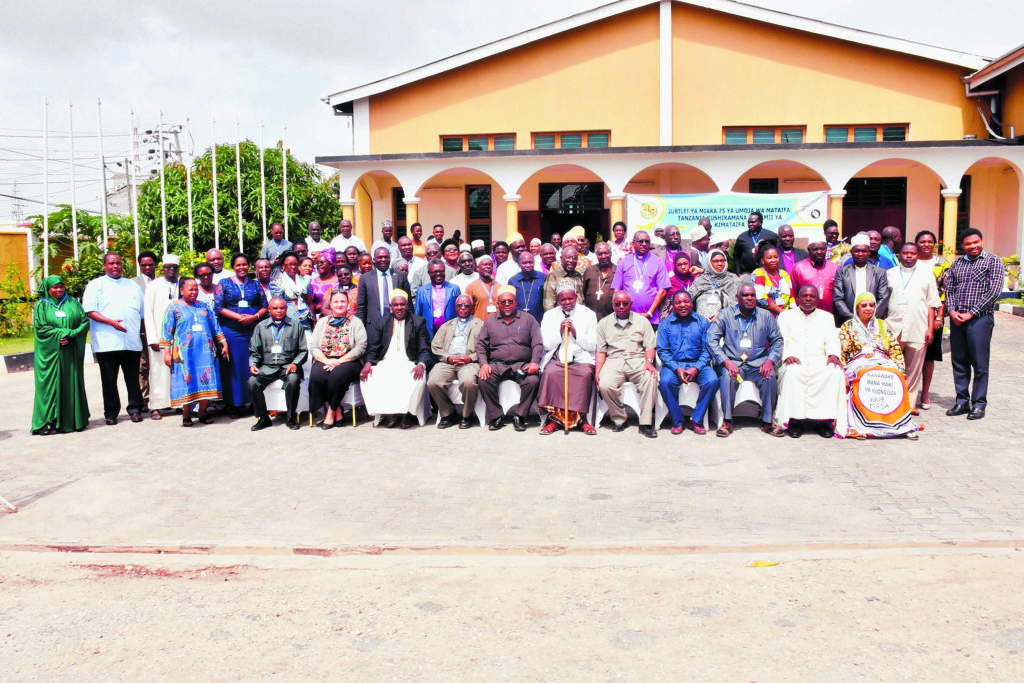TANZANIA: Religious leaders in Tanzania celebrate 75 years of the UN

Group Photo for the Religious leaders in Tanzania
Sarah Pelaji
Religious leaders under the umbrella of interfaith Tanzania which comprises National Muslim Council of Tanzania (BAKWATA), Christian Council of Tanzania (CCT) and Tanzania Episcopal Conference (TEC) have celebrated the 75th anniversary of the United Nations (UN) on December 15 this year at AMECEA Conference Hall at Kurasini, Dar es Salaam.
And October 24, 1945 was the day the United Nations officially began.
Despite the many issues that have been discussed, religious leaders have highlighted the importance of the existence of the UN as it has helped to establish a platform for world unity.
The UN Charter, which was adopted and signed on June 26, 1945 in San Francisco in the United States by 50 states, June 26 this year, marks 75 years.
The constitution was signed on June 26, 1945 at the conclusion of an international conference for the establishment of the United Nations and came into existence in October 24, 1945, with the International Court of Justice (ICJ) agreement being one of the six main pillars of the UN constitution.
The Secretary General of the Tanzania Episcopal Conference, Rev. Charles Kitima, made it clear that, despite the various challenges facing the United Nations, it is an important forum for discussing various international issues.
“The presence of the UN is important as you cannot have population of billions of people in the world and lack a platform to meet,” he said.
Referring to the UN Declaration of 1948 consisting of 30 articles, Article no. 7 states “Before the law all people are equal and deserve equal protection. In addition, the UN has constitutionally stated that everyone has the right to worship what she /he believes.
Violence against people on the basis of their religion or belief is a violation of human rights. So religious leaders support the establishment of the UN and see its importance as it protects the fundamental human rights and nations need an international forum to discuss and defend what they believe.
Auxiliary Bishop of the Catholic Diocese of Bukoba Rt. Rev. Methodius Kilaini has appreciated the establishment of the United Nations, despite the challenges it faces.
He insisted that, even if there are various challenges we must acknowledge the importance of the UN as it has helped to quell violence and bring about international understanding.
In addition, some members raised some of the UN’s challenges, saying that its goals are clear but implementation is weak as the laws of the UN member states they are more powerful than the laws of the United Nations as an organization.
Presenting the objectives, challenges and success of UN, Deus Kibamba from Tanzania Constitution Forum said that the purpose of establishing UN was to coordinate international relations through international law and treaties in areas such as security, peace, social and economic development, human rights, freedom, democracy.
The main objectives of the United Nations include safeguarding international peace and security, defending and protecting human rights, promoting economic and social development, protecting the environment, and providing humanitarian assistance in the event of natural disasters, famines and war.
In an effort to prevent developed countries from oppressing developing countries, the powerful should not violate the weak, and that is why UN has set limits on the borders between countries, even borders at sea, rivers and lakes; and it ensures that bullying does not exist in the world.
Religious leaders from CCT, Bakwata and TEC also focused on reflecting on how productive international cooperation since Tanzania gained independence has been productive.
Coordinator of the Interfaith Union Edmund Matotay explained that Tanzania is not an island: it is a country that is a member of the UN just like any other country in the world; Tanzania needs international cooperation and is required to make its contribution to the nations.
He called on the religious leaders in the country to reflect and ask themselves what role do religious organizations play in strengthening international relations?
What role have religions played in the construction of fundamental rights in the UN Constitution; what do our faith communities think about the trend of international cooperation?


